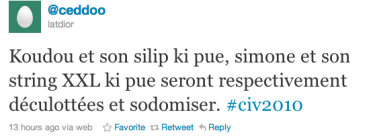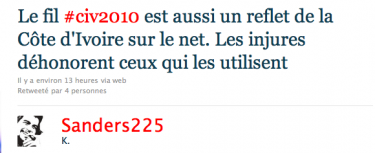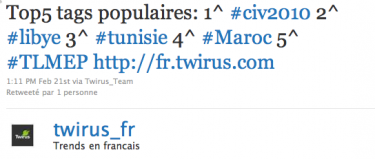This post is part of our special coverage Côte d'Ivoire Unrest 2011.
After a little rest in coverage, the international media is once again looking to Côte d'Ivoire. The last five days have seen the country experience further violence and increased radicalisation of Ivorian netizens’ speeches.
On February 19, 2011, a peaceful “revolution” [fr], so-called by Guillaume Soro – prime minister of internationally recognised President Alassane Ouattara – was organised at several locations in the country. Ouattara claims to have won the 2010 election against Laurent Gbagbo, president since 2000, and as such has declared himself to be the legitimate president of Côte d'Ivoire.
Demonstrators Killed
The protests were violently repressed in Abobo, a pro-Ouattara district of Ivorian economic capital Abidjan, leaving at least 3 people killed [fr].
The following video shows tanks belonging to the United Nations Organisation in Côte d'Ivoire (UNOCI) protecting Ouattara supporters protesting against Gbagbo:
Tchélé Kobres shot and posted the following video on the Facebook group ‘Observatoire démocratique en Côte d'Ivoire‘ [fr]; the group is described as a free forum to exchange on democratic progess in Côte d'Ivoire and counts more than 2,000 members.
The video shows a darkly dressed man shooting on unarmed demonstrators on Saturday February 19, 2011:
On February 21, 2011, the day that the protests were referred to as an “Egyptian-like Revolution” by Guillame Soro, seven people [fr] were reportedly killed among Ouattara's supporters.
Ivorian netizens shared videos showing dead demonstrators. This video (WARNING: GRAPHIC) posted by mdosso4002 on Youtube, shows the dead bodies of pro-Ouattara protestors killed in Koumassi, Abidjan, by rockets fired by Gbagbo's Force of Defense and Security (FDS).
The citizen shooting the video comments:
Le sang n'est pas versé pour rien Gbagbo
The Twitter hashtag #civ2010 has become increasingly radicalised in the wake of the protests, with tweets becoming more and more violent:
Other Twitter users tried to temper the situation:
Another Twitter user encourages people living in Abobo, a pro-Ouattara district of Abidjan, to continue the struggle:
A rumour that has not been confirmed says that pro-Ouattara citizens living in Abobo organised a vendetta against the FDS:
In the meantime, the hashtag #civ2010 was a top trending topic for Twitter France, according to Twirus:
This post is part of our special coverage Côte d'Ivoire Unrest 2011.












6 comments
I was in Côte d’Ivoire for the first round of the elections. I felt the hope and determination of Ivorians to peacefully reunite their country and move forward. They achieved something remarkable and came so close, and that makes what has happened even more difficult. Obviously, there are real issues in Côte d’Ivoire, especially around citizenship and land ownership. But there was a remarkable mood of reconciliation and social cohesion in October and early November and stirrings of trust between north and south. Now all those giant steps forward have been lost and so much more. The fissures have become deep fractures. Ouattara’s recent speech is a step in the right direction, but in the meantime, ordinary people, especially those in Abobo, live under very difficult circumstances. For a firsthand account via skype see my piece at
http://open.salon.com/blog/carol_spindel/2011/03/12/dark_nights_in_abidjan_ivory_coast or at my website address above.